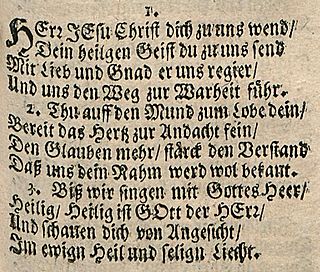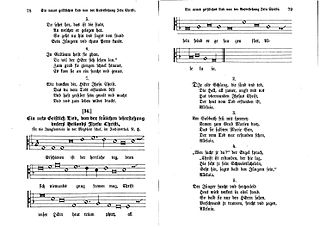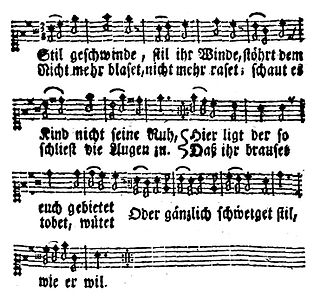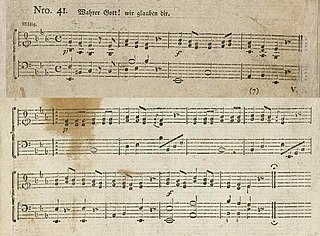Related Research Articles

"Herr Jesu Christ, dich zu uns wend" is a Lutheran hymn from the 17th century. Its hymn tune, Zahn No. 624, was adopted in several compositions. It was translated into English and is part of modern hymnals, both Protestant and Catholic.
Georg Thurmair was a German poet who wrote around 300 hymns, a writer, journalist and author of documentary films.
Adolf Lohmann was a German music educator and a composer of sacred music. Several of his hymn melodies are part of the Catholic hymnal Gotteslob.

"Erschienen ist der herrlich Tag" is a German Easter hymn, with text and tune written by Nikolaus Herman and published in 1561. It has inspired musical settings by composers from the 17th to the 20th century. It appears in several hymnals, including the German Protestant hymnal Evangelisches Gesangbuch. Other hymns, especially Easter hymns, in both German and English, are sung to the same melody.
"Den Herren will ich loben" is a Christian hymn by Maria Luise Thurmair, based on the Magnificat and set to a 1613 melody by Melchior Teschner, which was used for "Valet will ich dir geben". The hymn in three stanzas of eight lines was first written in 1954, and revised in 1971. It appeared in the Catholic hymnal Gotteslob in 1975, and in the current Gotteslob, but also in a German Protestant hymnal. A general song of praise, it has been set to music several times.

"Erde, singe" is a German Catholic hymn with a text by Johannes Cardinal of Geissel, Archbishop of Cologne, written in 1837 as a Christmas carol in ten stanzas. The current Catholic hymnal Gotteslob has only four stanzas as GL 411, which are in the general section of praise.

"Christ fuhr gen Himmel" is a German Ascension hymn. The church song is based the medieval melody of the Easter hymn "Christ ist erstanden". It was an ecumenical song from the beginning, with the first stanza published in 1480, then included in a Lutheran hymnal in 1545, and expanded by the Catholic Johannes Leisentritt in 1567. It appears in modern German Catholic and Protestant hymnals, and has inspired musical settings by composers from the 16th to the 21st century.

""Wahrer Gott, wir glauben dir" is a Catholic hymn. Christoph Bernhard Verspoell (1743–1818), a cleric from Münster, wrote text and melody, and published it in 1810 in his hymnal Orgelbegleitung zu den Gesängen beym Römisch-kathol. Gottesdienste. Herausgegeben von C. B. Verspoell. The song in two stanzas has remained in the repertory of church hymns, used mainly during Eastertide, but also for communion and funerals. It appears in several regional sections of the Catholic hymnal Gotteslob, as GL 770 in Cologne, as GL 780 in Limburg and Münster, and as GL 783 in Speyer, among others.

"Nun, Brüder, sind wir frohgemut" is a German Catholic hymn. It was written by Georg Thurmair as both a pilgrimage song and a Marian hymn. The melody was composed by Adolf Lohmann, who wrote a choral setting in 1936. Related to youth pilgrimages to an image of Mary at the Altenberger Dom, it is also known as "Altenberger Wallfahrtslied". The song is regarded as an Oppositionelles Lied, in subtle protest against the Nazi regime.

"Gott, der du warst und bist und bleibst" is a Christian hymn with text by Eugen Eckert and a melody by Herbert Heine. It is also known by the title of its refrain, "Wir haben hier keine bleibende Stadt". The song was written in 1993, in the genre Neues Geistliches Lied (NGL). It appears in several regional sections of the German Catholic hymnal Gotteslob, and in other songbooks.

"Dein Lob, Herr, ruft der Himmel aus" is a German Catholic hymn. Adolf Lohmann adapted a 1659 hymn by the Jesuit astronomer Albert Curtz, who paraphrased Psalm 19. The melody appeared in Augsburg in 1669. It was No. 1 in the 1938 hymnal Kirchenlied and is part of the German Catholic hymnal Gotteslob as GL 381.
Friedrich Dörr was a German Catholic priest and professor of theology, who is known as a hymnwriter. He shaped the first common German Catholic hymnal, Gotteslob, published in 1975.
"Herr, wir bringen in Brot und Wein" is a Christian offertory hymn with German text by Hans Bernhard Meyer, and a melody by Peter Janssens. The song, of the genre Neues Geistliches Lied (NGL), is part of German hymnals, including Gotteslob, and songbooks.
"Nun singt ein neues Lied dem Herren" is a Christian hymn with German text by Georg Thurmair. He based it on Psalm 98 and wrote it in 1967 to match a traditional 16th-century melody. The song is part of German hymnals, including Gotteslob, and songbooks.
"Lasst uns Gott, dem Herrn, lobsingen" is a Christian hymn in German with text by Petronia Steiner written in 1944 to a melody that Johann Georg Ebeling created in 1666 for a hymn by Paul Gerhardt. It is contained in regional sections of the Catholic hymnal Gotteslob.
"Lob Gott getrost mit Singen" is a Lutheran hymn in German, a paraphrase of the Latin Te Deum, by the Bohemian Brethren. The hymn is part of the current Protestant hymnal. The hymn was translated into English as "Praise God, praise God with singing". The hymn tune was used for several hymns in different languages, denominations and centuries.
"O komm, du Geist der Wahrheit" is a Lutheran hymn for Pentecost in German. The text was written by Philipp Spitta, probably in 1827, and published in 1833 in the song collection Psalter und Harfe. It is a prayer to the Holy Spirit for courage to confession in a time poor in faith. The hymn which first appeared without a melody, is now usually sung to the 1529 melody of "Lob Gott getrost mit Singen". It is part of the current Protestant hymnal, and of other hymnals.
"Nimm, o Gott, die Gaben, die wir bringen" is the beginning of a Christian offertory hymn with German text by Raymund Weber, and a melody that Andrew Lloyd Webber composed for his musical Jesus Christ Superstar. The song, of the genre Neues Geistliches Lied (NGL), is part of German hymnals, including Gotteslob. Two other songs use the same melody.
"Manchmal feiern wir mitten im Tag" is a Christian hymn written in 1974 with German text by Alois Albrecht and a melody by Peter Janssens. The song, of the genre Neues Geistliches Lied (NGL), is part of German hymnals, including Gotteslob, and songbooks including ecumenical collections and books for young people. It begins: "Manchmal feiern wir mitten im Tag ein Fest der Auferstehung".
"Segne, Vater, diese Gaben" is a Christian hymn. The authors of text and melody are unknown. It is meant to be sung as a round. The song, which is often used for a prayer before a meal, has appeared in German hymnals and songbooks. It is regarded as a song of the genre Neues Geistliches Lied (NGL), and has been used in schools and events for young people.
References
- 1 2 3 "187 / Wir weihn der Erde Gaben (L) / Gesänge - Woche - Gesänge zur Gabenbereitung". mein-gotteslob.de (in German). 2022. Retrieved 24 April 2022.
- 1 2 3 "187 Wir weihn der Erde Gaben". dli-daten.de (in German). Retrieved 2 February 2021.
- ↑ "Wir weihn der Erde Gaben". evangeliums.net (in German). 2022. Retrieved 24 April 2022.
- ↑ "Geschichte des Nikolaus-von-Weis-Gymnasiums – Wichtige Daten und Ereignisse" (in German). Nikolaus-von-Weis-Gymnasium Speyer. Retrieved 2 February 2021.
- ↑ "453; ö / Wir weihn der Erde Gaben (L) / Leben in Gott – Segen". gotteslob.at (in German). 2022. Retrieved 24 April 2022.
- 1 2 "Lob Gott getrost mit Singen / O komm, du Geist der Wahrheit" (in German). Carus-Verlag . Retrieved 21 February 2021.
- ↑ "Lob Gott getrost mit Singen". hymnary.org. Retrieved 21 February 2021.
- ↑ Zehetbauer, Johann Paul. "Zehetbauer - Lieder und Chorsätze zum Kirchenjahr / Wir weihn der Erde Gaben" (PDF) (in German). Christophorus Verlag. Retrieved 1 May 2022.
- ↑ Planyavsky, Peter (2022). "Peter Planyavsky (* 1947) / Wir weihn der Erde Gaben". stretta-music.de (in German). Retrieved 1 May 2022.
- ↑ Karas, Markus; Klomp, Carsten, eds. (2022). "Ökumenisches Orgelbuch" (PDF) (in German). Bärenreiter. pp. IV, 344. Retrieved 1 May 2022.